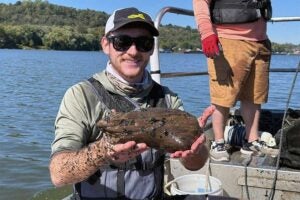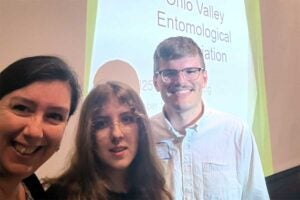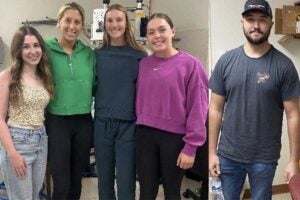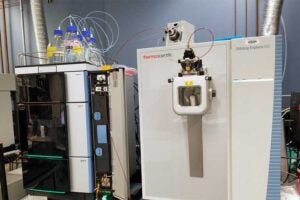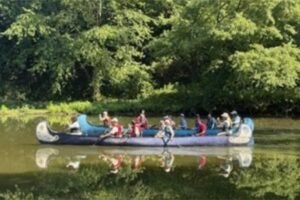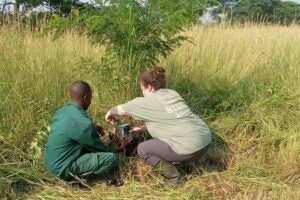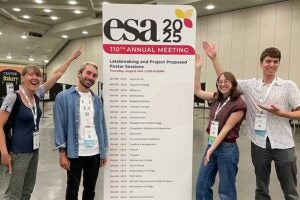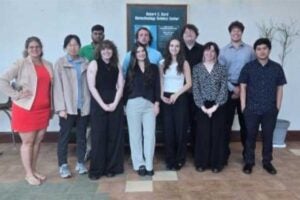Research News Archive
Environmental Science students are gaining hands-on field experience through ongoing research along the Ohio River. This week, the team sampled six additional sites in the lower Greenup Pool, bringing their total to 13 randomized sites—from the Big Sandy River downstream. The group collected data on benthic fish communities, substrate composition, mussel counts, and invertebrates captured
The College of Science congratulates Dr. Gabriela Puppo and her graduate students, Noah Adkins and Erica Edinger, from the Department of Biological Sciences for representing Marshall University at the 2025 Ohio Valley Entomological Association Annual Meeting in Burlington, Kentucky. Adkins and Edinger each gave research presentations highlighting their ongoing work in Dr. Puppo’s lab, earning
Congratulations to Dr. Maria Hamilton, professor in the Department of Mathematics and Physics, on receiving funding from the National Science Foundation for her project “Cross-Validation of Binary Neutron Star Mergers Simulations across Multiple Codes.” The three-year, $150,000 award will advance research into binary neutron star mergers—rare cosmic events that offer valuable insights into the laws
College of Science Chemistry faculty members Dr. Shin Moteki (principal investigator) and Dr. Scott Day (co-principal investigator) have secured a $568,000 grant from the National Science Foundation (NSF) to advance research on renewable polymer-based catalysts. The project engages a team of dedicated student researchers, including Lauren Dunsmore, Abby Darnley, Ramey George, Mackenzie Maynard, and Cody
Dr. Herman Mays, professor of biological sciences, recently co-authored a new publication examining the population structure of three crested penguin species in New Zealand. The research offers important insights for conservation: tawaki penguins appear stable and genetically diverse, while erect-crested penguins are divided into two distinct populations—those from the Antipodes Islands and those from the
The College of Science is celebrating a major research advancement thanks to a $530,000 Major Research Instrumentation (MRI) grant from the National Science Foundation (NSF). The award, led by Dr. Leslie Frost, Dr. Rosalyn Quiñones, and their colleagues, will fund the purchase of an Orbitrap Exploris 240 mass spectrometer (LC/MS/MS). This cutting-edge instrument will be
Dr. Mindy Yeager-Armstead, along with colleagues from the University of Kentucky and University of Louisville, recently hosted a 3-day workshop to kick off the 2025–26 cohorts of two National Science Foundation–funded STEM programs: IMHubs and FLASH. These concurrent 10-month programs give undergraduates hands-on research experience, mentoring from faculty, opportunities to network, and even chances to
Mary Zarilla, a master’s student in Dr. Anne Axel’s lab, spent her summer in Uganda conducting fieldwork for her thesis on mammalian biodiversity in the Albertine Rift’s Toro-Semliki Wildlife Reserve. This unique site is known for its dry-habitat chimpanzees and is home to the Semliki Chimpanzee Project, where our own Kim Dingess leads annual field
The Palmquist Lab recently brought Marshall University science to the national stage at the 110th Annual Meeting of the Ecological Society of America (ESA) in Baltimore, Maryland. Lab members Zak Bartholomew, Catie Schwartzmann, and Noah Manuszak shared their research through poster presentations, while Dr. Kyle Palmquist contributed to an all-day working session as part of
On July 25, 2025, Marshall University’s Summer Undergraduate Research Experience (SURE) students took center stage at the Chemistry Symposium to present the results of their summer research projects. Throughout the program, participants not only shared their work every two weeks but also bonded over a high-energy paintball outing. Funded by the West Virginia Challenge Fund
